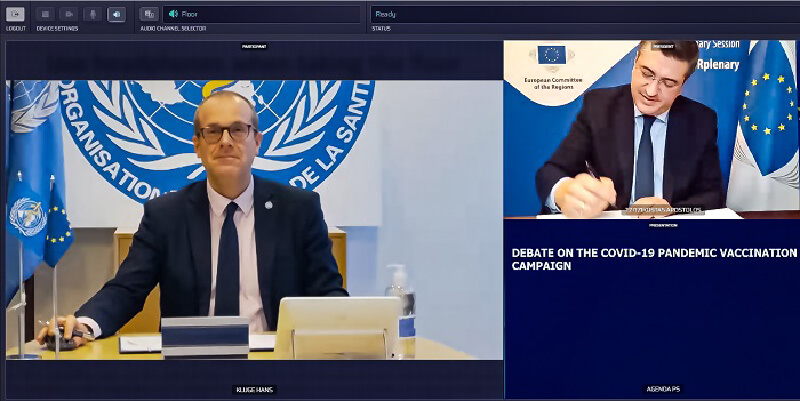Stakeholders in the health sector widely welcomed the long-awaited Europe’s Beating Cancer Plan, unveiled on Wednesday (3 January), as a “new era for cancer care and cancer patients” which places the European Union at the forefront of research and innovation efforts.
The €4 billion flagship plan is a key pillar of the European Health Union, presented by President of the European Commission, Ursula von der Leyen, in November 2020 as part of creating a more secure, resilient and better-prepared EU.
With an emphasis on research and innovation, the cancer plan sets out a new EU approach to cancer which targets the entire disease pathway, from prevention to quality of life of cancer patients and survivors.
As part of the effort to tackle cancer holistically, the plan will be supported by actions spanning across policy areas from employment, education, social policy to agriculture and the environment.
Commenting on the publication of the plan, von der Leyen pointed out that while all eyes have been on COVID-19, Europeans were fighting a “silent battle” against cancer.
In 2020 alone, 2.7 million people in the EU were diagnosed with the disease, and another 1.3 million people lost their lives to it.
Despite making up less than 10% of the world’s population, Europe accounts for almost a quarter of global cancer cases and although cancer care and treatment are still making great strides, the number of European citizens diagnosed with cancer has almost doubled over the past two decades.
“Nearly half of EU citizens will face cancer at some point of their lives. Without further action, cancer will become the leading cause of death in Europe. We can reverse this trend, but I am afraid there is no room for failure,” said Antonella Cardone, European Cancer Patient Coalition (ECPC) director.
With this plan, the European Commission aims to turn the tide on this and ensure that the EU is ready to make the most of the ground-breaking innovations that cancer care research has brought forth over the past few decades.
Nathalie Moll, director-general of the European Federation of Pharmaceutical Industries (EFPIA), welcomed the plan, telling a news conference on Wednesday (3 January) that with it Europe launches a “new era for cancer care and cancer patients”.
“We should all be ambitious and accountable. That’s why we as the bio-pharmaceutical industry are committed to working with all stakeholders on the concept of a cancer dashboard where we set concrete and measurable targets to prevent, treat and cure cancer,” she said.
Cardone also welcomed the inclusion of a multi-stakeholder ‘dashboard’, highlighting its role in measuring the success of the plan.
“We do believe that what gets measured, gets done,” she stressed.
First presented at the European Health Forum Gastein in October 2020, the dashboard is a monitoring and implementation tool designed to underpin the plan and facilitate cooperation between stakeholders.
Push on personalised medicine, genomic therapies
The plan aims to keep the EU at the forefront of research and innovation when it comes to cancer.
To support new technologies, research and innovation, a new knowledge centre on cancer will be launched to help coordinate scientific and technical cancer-related initiatives at the EU level, while a European cancer imaging initiative will be set up to support the development of new computer-aided tools to improve personalised medicine and innovative solutions.
Biotechnology company EuropaBio pointed out that there is a “significant opportunity” for the healthcare sector arising from the development of personalised medicine, genomics, and artificial intelligence, which will have an “increasing impact in cancer care and research”.
“To maximise the potential gains from these growing areas, the EU must reduce obstacles to the collection, sharing and utilisation of real-world data,” they said.
EFPIA’s Moll added that “new innovation in personalised oncology, gene therapies and combination therapies require innovative health systems, long-term investment and strong partnerships”.
Cooperation is key
With cancer set to become Europe’s leading disease burden, the case for concerted cooperation between countries on tackling cancer has never been stronger, stakeholders highlighted, adding that the plan will help guide country efforts and includes commitments to shared goals and actions.
Matti Aapro, president of the European Cancer organisation (ECO), said the COVID-19 crisis has underscored the importance of tackling cancer as a collective whole.
“We have gone through a major crisis and this has taught us that there are no borders for these major challenges like cancer,” he said.
“Setting common goals on cancer at the European level is a fantastic start, and we are delighted to see that level of ambition and leadership in Europe’s Beating Cancer Plan. The next stage is driving forward the actions required to meet those ambitions, and monitoring progress towards the achievement of the agreed goals,” he said.
[Edited by Zoran Radosavljevic]














